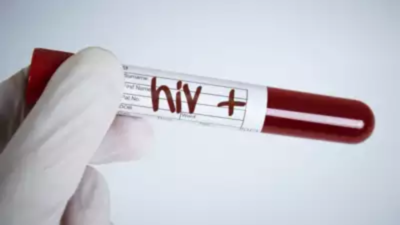Top Searches
- News
- City News
- Hyderabad News
- Hyderabad: Red Cross at crosshairs, can't track donors after fatal HIV jab
Hyderabad: Red Cross at crosshairs, can't track donors after fatal HIV jab

Representative Image
HYDERABAD: Despite the lapse of a month since a three-year-old thalassemia-affected boy tested positive for HIV - allegedly post a blood transfusion session at the Indian Red Cross Society (IRCS), Nallakunta - the blood bank has failed to make any headway in tracking down the infected donor.
Soon after the child's parents lodged a police complaint on July 30 - 10 days after he tested positive for HIV - IRCS stated that the boy had received blood from 40 donors and that it would reach out to each of them to ascertain the source of the infected blood. But 20 days later, the centre has now admitted that it has not managed to get even a single donor to come forward and take a fresh blood test to check for HIV. According to society officials, the donors are either unreachable or unwilling to take a test.

At the time of donation, all the 40 had tested negative for the virus, IRCS maintained.
"We follow a protocol and note their contact details at the time of donation. Though we have approached all of them, some do not want to come back to the centre while some others haven't responded to our calls, despite repeated attempts," said Dr K Pitchi Reddy, director of the IRCS Nallakunta bank.
Independent experts express concern over this roadblock. "Not only is the donors' information crucial to this case as the parents have maintained that the child received no transfusion outside IRCS, but it is also important to ensure we curb the spread of HIV. Unless we track down the infected person and stop him/her from making any further blood donations, the donor can affect more people," said one of them.
When contacted, the station house officer of Nallakunta police station, M Ravi, said that they are now weighing legal options to make a headway in the case. "Owing to the privacy clause of donors, we cannot make any rash moves because it will then snowball into a complicated legal issue. Though we do not have any legal provisions at our disposal at the moment to coerce these donors to take a test, we are in the process of understanding our legal options, including the possibility of approaching the court," said Ravi.
Meanwhile, it is learnt that a central team comprising two drug inspectors are in town to investigate the matter. A state-level team of doctors from ESI, Gandhi and Apollo has also been constituted to look into the case.
"We have given all our records and case sheets to the central and state teams. We are hoping to improve our own operations once we receive their report," added Dr Reddy.
Soon after the child's parents lodged a police complaint on July 30 - 10 days after he tested positive for HIV - IRCS stated that the boy had received blood from 40 donors and that it would reach out to each of them to ascertain the source of the infected blood. But 20 days later, the centre has now admitted that it has not managed to get even a single donor to come forward and take a fresh blood test to check for HIV. According to society officials, the donors are either unreachable or unwilling to take a test.

At the time of donation, all the 40 had tested negative for the virus, IRCS maintained.
"We follow a protocol and note their contact details at the time of donation. Though we have approached all of them, some do not want to come back to the centre while some others haven't responded to our calls, despite repeated attempts," said Dr K Pitchi Reddy, director of the IRCS Nallakunta bank.
Times View
Indian Red Cross Society vehemently defended itself after a police complaint was lodged by parents of a boy, who contracted HIV after blood transfusion. IRCS claimed they had records of all donors, who can be summoned anytime for verification and the error did not happen at their end. One month on, it’s still scrambling for donor info. Police and the administration need to immediately crack down on IRCS and trace tainted donors before more patients fall to the fatal disease.
Independent experts express concern over this roadblock. "Not only is the donors' information crucial to this case as the parents have maintained that the child received no transfusion outside IRCS, but it is also important to ensure we curb the spread of HIV. Unless we track down the infected person and stop him/her from making any further blood donations, the donor can affect more people," said one of them.
When contacted, the station house officer of Nallakunta police station, M Ravi, said that they are now weighing legal options to make a headway in the case. "Owing to the privacy clause of donors, we cannot make any rash moves because it will then snowball into a complicated legal issue. Though we do not have any legal provisions at our disposal at the moment to coerce these donors to take a test, we are in the process of understanding our legal options, including the possibility of approaching the court," said Ravi.
Meanwhile, it is learnt that a central team comprising two drug inspectors are in town to investigate the matter. A state-level team of doctors from ESI, Gandhi and Apollo has also been constituted to look into the case.
"We have given all our records and case sheets to the central and state teams. We are hoping to improve our own operations once we receive their report," added Dr Reddy.
FOLLOW US ON SOCIAL MEDIA
FacebookTwitterInstagramKOO APPYOUTUBE
Start a Conversation
end of article










